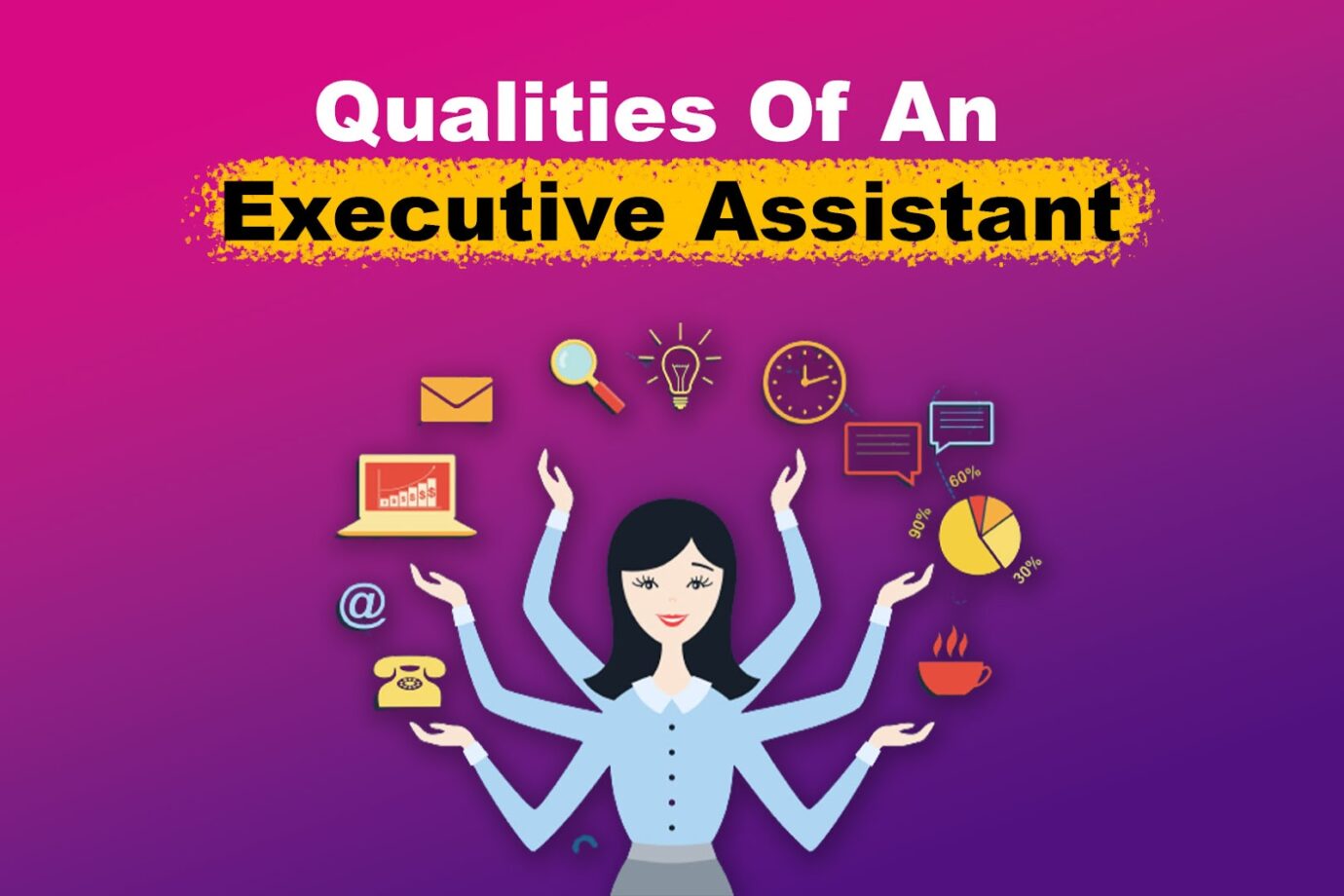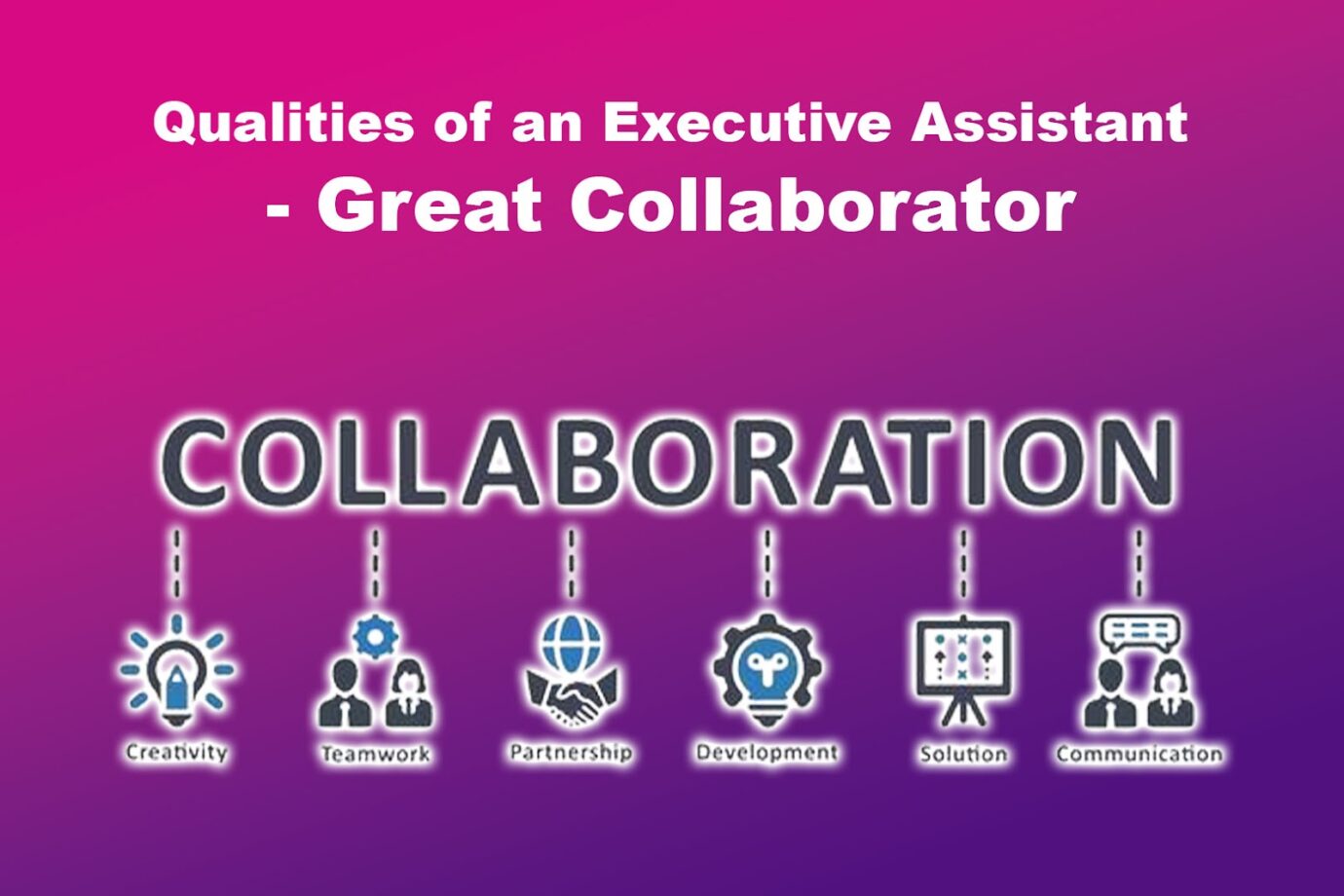An executive assistant is essential to an organization, serving as a vital support system for high-level executives and leaders. These professionals possess unique qualities that set them apart and contribute significantly to the success of an executive team.

Executive assistants serve as more than just support staff; they are strategic partners, acting as gatekeepers, adept problem solvers, and essential bridges connecting executives with the broader organization.
Keep reading to delve into the standout qualities of an executive assistant, their multifaceted roles, the challenges they navigate, and compelling reasons why you should hire an executive assistant.
11 Best Qualities of an Executive Assistant
The best qualities an executive assistant can possess include excellent organizational skills, outstanding communication skills, a knack for smooth collaboration, and a high level of professionalism. Additionally, an executive assistant should demonstrate resourcefulness, some tech skills, and a willingness to learn.
Here are the 11 best qualities of an executive assistant in detail:
1. Outstanding Professionalism
Assistants must interact with individuals across all levels of an organization, ranging from mailroom staff to the CEO. Thus, professionalism is critical. They must treat everyone equally and avoid indulging in company politics or gossip.
In most cases, they are the face and gatekeepers of the company. This means anyone who wants to meet the boss, from employees to clients, might have to go through them. This requires them to talk to many people, underscoring the importance of maintaining professionalism.
Learn more about professionalism in business.
2. Trustworthiness
Above all, trust is a crucial element in any partnership. As an executive assistant, business executives entrust you with confidential information such as personal emails, family matters, and financial statements. The ability to handle this information with utmost privacy is a highly valued quality.
Moreover, the relationship between an executive assistant and their boss is built on trust. Losing trust can significantly hinder one’s ability to operate effectively within the organization.
3. Knowledge of Technology
Besides being resourceful, a rockstar executive assistant should be familiar with the latest technology. In addition to the usual knowledge of using tools like Microsoft Office or Google Docs, they should also know how to navigate other apps like Slack, Salesforce, or Zoura to make their work easier.

The function of an executive assistant has evolved beyond traditional responsibilities like answering phone calls and completing paperwork. They may also need to handle complex projects that require advanced technological skills, such as social media management.
4. Excellent Organizational Skills
An executive assistant has highly diverse responsibilities. A rockstar executive assistant must possess the skills to manage multiple company operations. Apart from being fast, the ability to multitask organizationally is equally crucial.
Great assistants must be prompt and responsive, have excellent prioritization skills, and be proficient in scheduling appointments, planning schedules, and organizing documents. Without an orderly system, businesses may lose track of essential details or miss deadlines.
5. Exceptional Communication Skills
To be effective, assistants must have excellent communication skills to interact with various individuals, including colleagues, bosses, clients, and suppliers. They should possess proficiency in both written and verbal communication, enabling them to create formal business letters and memos and ensure their emails are well-constructed before sending.
Additionally, assistants should be able to maintain positive interactions with other executives and their support team while conducting business.
6. Great Collaborator
A rockstar executive assistant must be able to collaborate with others in the company to accomplish various tasks. This involves understanding that every employee is part of a team, so they should be treated as such.

So, an assistant should be ready to help their colleagues who need support to ensure an efficient workflow.
7. Resourcefulness
Another key skill of a great executive assistant is resourcefulness. Great assistants know how to find answers even where there are none. They should be able to think outside the box and find creative solutions to unique problems.
They should not just give what they are asked to do but also develop new ways to look at things they may not have initially thought about.
Read more about resourcefulness.
8. Willingness to Learn
The job market is evolving, and another best quality of an executive assistant is their willingness to learn. Executive assistants should not only be able to perform their current role but also be prepared for the changing demands and opportunities that come their way.

Keep in mind that the responsibilities of an executive assistant can change over time, depending on the needs or goals of the company. Thus, being open to learning new skills can help you adapt to new tasks and responsibilities
9. Composure
One of the best qualities of an executive assistant is the ability to stay calm in stressful situations. The job is very demanding and high-pressure, and executives can sometimes transfer their stress to their assistants.
For instance, your boss may require you to make a last-minute call, connect someone online, or even arrange travel plans. Maintaining composure will simplify your work and enable you to handle various day-to-day crises.
10. Adaptability
An executive assistant’s valuable quality is the ability to adapt rapidly to changing situations and handle unexpected challenges. It’s important to be flexible and able to think of solutions in various situations.
Additionally, you should be able to re-prioritize tasks and resources quickly to align with the organization’s changing needs. You must be open to different work styles, communication, preferences, and approaches.
11. Problem Solver
Executive assistants should be able to solve minor or other issues that the executive may not have time to deal with. They should be able to make proper decisions and provide alternative solutions.

For example, they might need to develop a plan to solve conflicts within the company, manage expenditure issues, or schedule meetings with challenging clients.
Related Article: Comparing Administrative and Executive Assistants
What Are the Roles of an Executive Assistant?
The three major roles of an executive assistant are administrative support, communication, and travel arrangements. Some minor roles are gatekeeping expense management, and project assistance. Note that these roles vary based on the executive needs, the industry, or the organization.
Here are the three major roles of an executive assistant in detail:
- Communication.
Executive assistants are the primary link between executives and clients, vendors, and other employees. They manage phone calls, emails, and other forms of communication to ensure executives can work on important things without interruption. - Administrative Support.
In addition to communication, executive assistants handle administrative tasks such as maintaining files and documents, managing calendars, and scheduling meetings and appointments. - Travel Arrangements.
It is common for executive assistants to handle the executive’s travel arrangements. This may include creating detailed itineraries for business trips and booking flights and accommodations.
Read more about what to delegate to a Virtual Assitant and the roles of an executive assistant.
What Are the 5 Smart Goals for an Executive Assistant
These are the five smart goals of an executive assistant:

- Specific.
Create a clear and detailed goal that will help you know where to start. Once you have set your objectives, consider your company’s goals and the steps you need to take to achieve them. Then, think about what’s involved and where it falls in the organizational structure. - Measurable.
When setting a goal, ensure you can track the goal and measure the outcome. Seeing your progress can motivate you and help you focus. In addition, it can show your commitment to the company and grow your role. - Achievable.
When creating your objectives, it’s essential to be realistic. Ensure your goals are achievable and you have the necessary capabilities and resources to complete them. There’s no need to aim for something you don’t have the time or resources to achieve. - Relevant.
Before setting your goals, ask yourself if they align with your role’s overall purpose. Ensure they align with the company’s objectives and contribute to its success. Then, ask yourself if it’s the right time to pursue the goal. - Time Bound.
It’s crucial to set a deadline for every smart goal you have. However, be realistic with your deadlines to ensure you have enough time to succeed. Also, set smaller objectives and ensure you regularly check your work to meet larger goals.
What Are the Benefits of Hiring an Executive Assistant
Here are the benefits of hiring an executive assistant:
- Increased Productivity.
By handling various tasks, executive assistants free up time for the executives. This means they can perform other tasks that can boost the company’s overall productivity. - Time Management.
Executive assistants can manage schedules, appointments, and tasks, allowing executives to focus on high-priority activities. They can also assist in prioritizing tasks, setting reminders, and meeting crucial deadlines. - Constant Support.
Executive assistants possess a diverse set of skills that enable them to provide support to anyone in the company as needed. They also have access to the executive’s plans and can share this information with other employees when necessary. - Cost Efficiency.
While executive assistants are an added expense, their ability to streamline processes and manage time effectively can increase productivity, resulting in a significant return on investment.
Learn more about the benefits of hiring an executive assistant.
What Are the Challenges of an Executive Assistant?
These are the challenges of an executive assistant:

- Flexibility.
Executive assistants must quickly adapt to changing priorities, which can be challenging. They might also have unpredictable schedules, including last-minute travel changes, meetings, or urgent matters. - Time Management.
While executive assistants must constantly manage various tasks, it can be difficult to coordinate schedules efficiently due to competing priorities and limited resources. - Confidentiality.
Executive assistants frequently handle sensitive information and documents. Safeguarding this information from unauthorized access, leaks, or breaches can be difficult. - Technology.
Executive assistants often struggle to keep up with the latest software and digital tools. They may also feel lost when these systems are unavailable.
Read more about the challenges of an executive assistant.